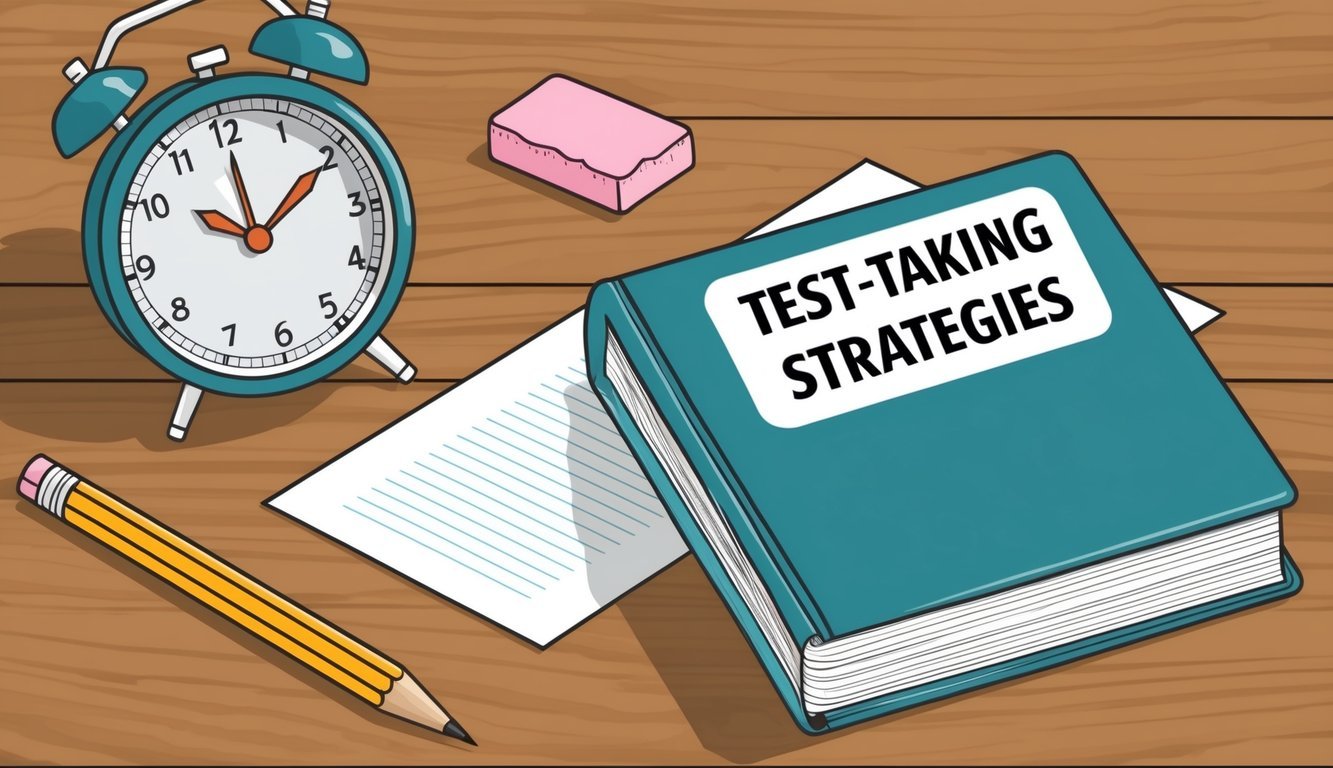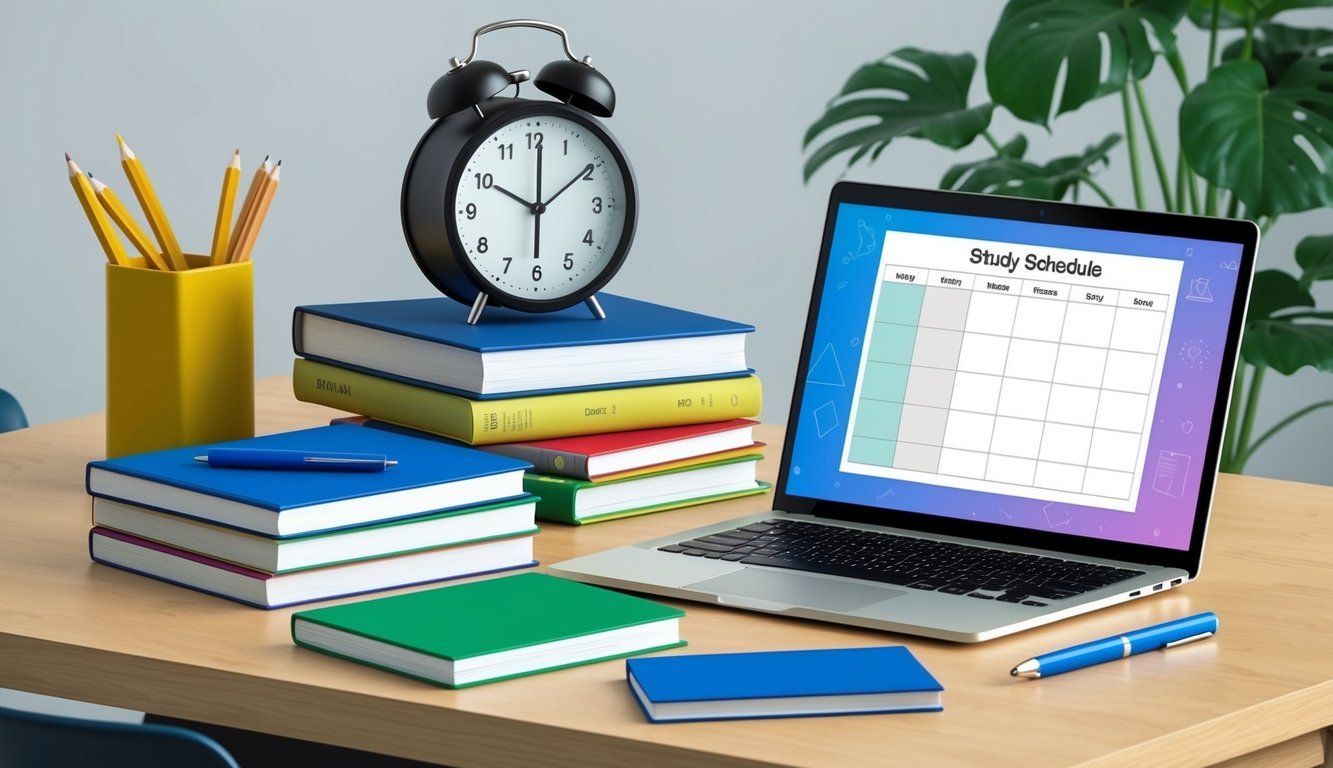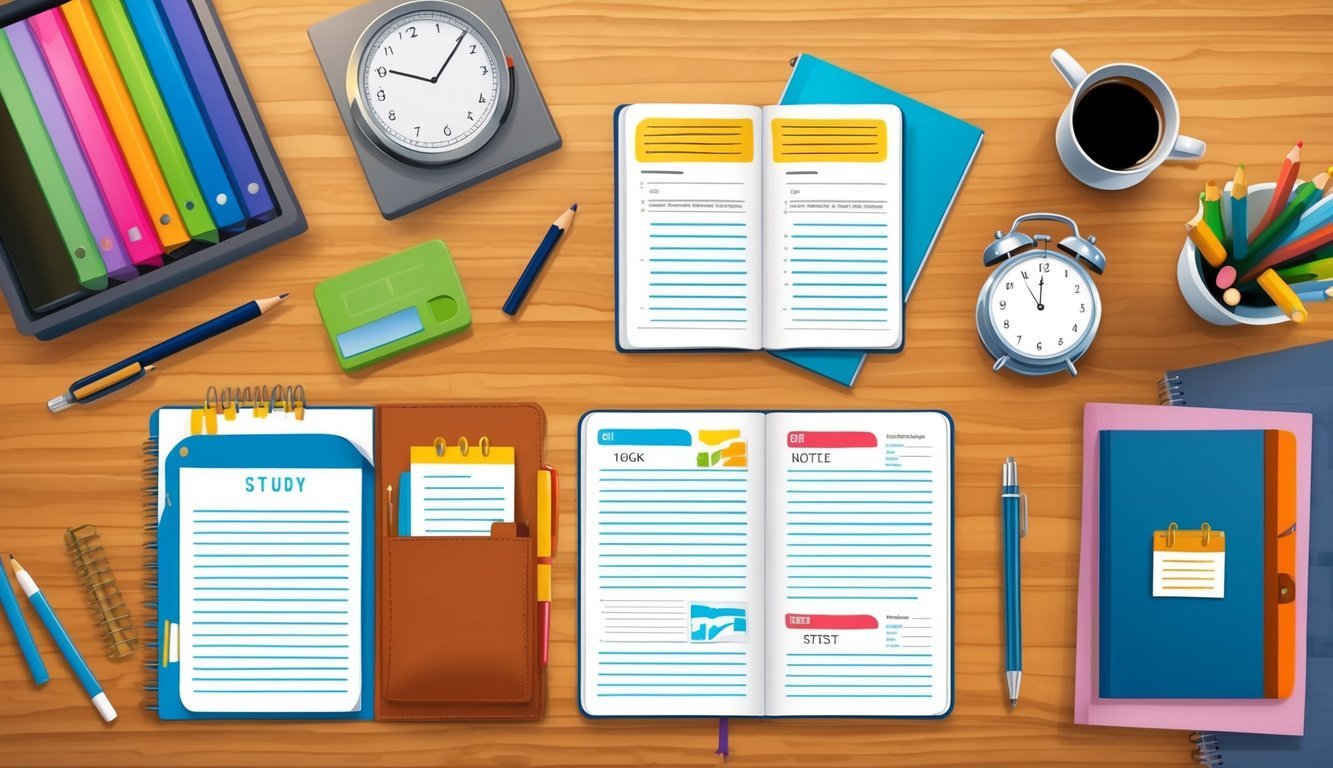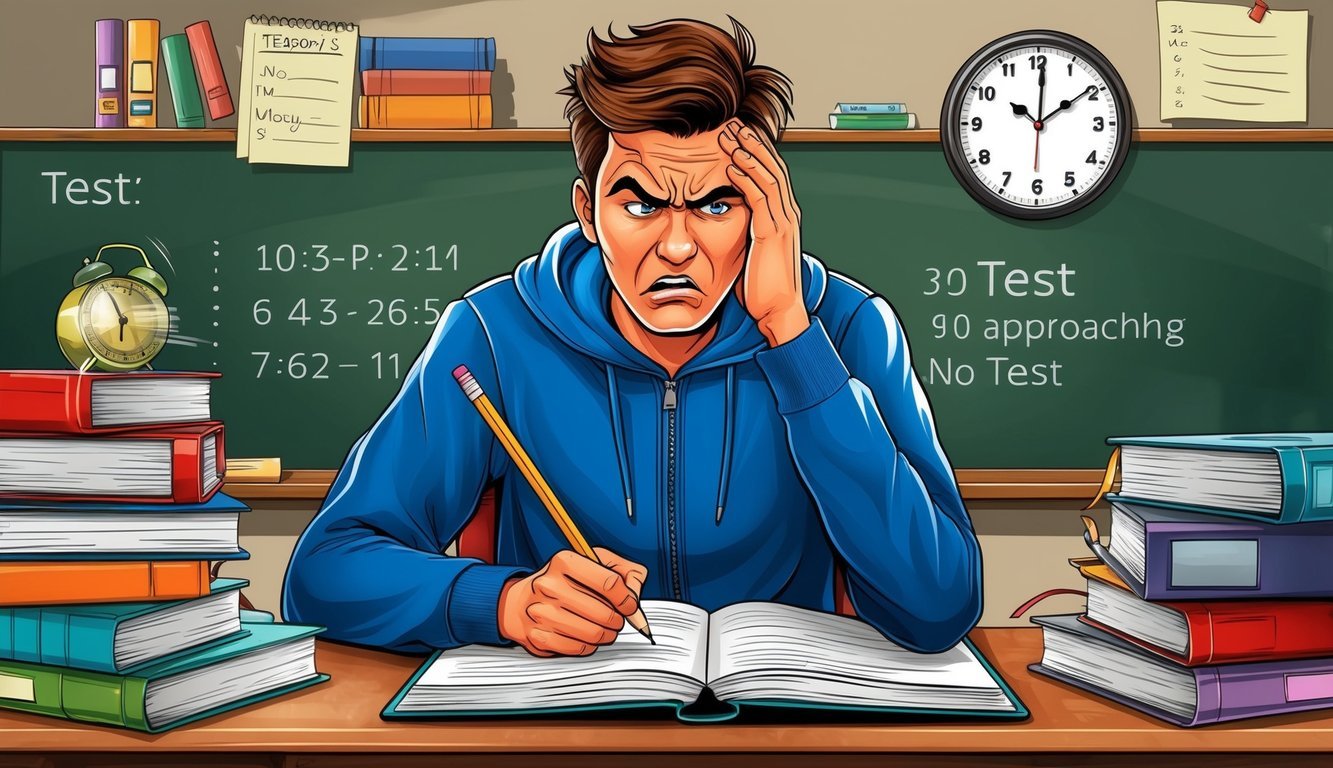Navigating the world of tests can seem overwhelming at first, but with a few smart strategies, you can ease some of that stress.
It’s all about sharpening your skills and fostering a mindset that radiates confidence and readiness for any exam that crosses your path.

*Imagine a desk with everything you need—an organized workspace bathed in natural light, a pencil ready to go, and a cozy notebook just waiting for your brilliant ideas.*
**By focusing on essential [test-taking tips](https://edusref.org/5-best-sat-preparation-courses/), you can boost your performance and amp up your chances of acing that exam.** Whether it’s a standardized test or a regular classroom quiz, understanding how to work smarter can make a world of difference.
### 1) Practice Regularly

Think of practicing like training for a big game.
You wouldn’t just hit the field without some practice, right? Consistent review is key.
It’s not just about cramming the night before; it’s about reinforcing what you’ve learned over time.
Set a routine with daily or weekly review sessions.
This keeps the material fresh and helps reduce anxiety when test day finally arrives.
Also, try completing [practice tests](https://edusref.org/6-best-gmat-prep-courses/) to get comfortable with the format and timing.
Oh, and if you haven’t tried forming a study group, give it a shot! It adds a layer of fun and collaboration, and explaining concepts to others can help lock in your own understanding.
Just like athletes hit the gym regularly, you should train your brain to be sharp too!
### 2) Understand the Test Format
Knowing the layout of the test is like having a treasure map; it guides you directly to where you need to go.
Spend time getting to know the structure—whether you’re facing multiple-choice questions, essays, or some tricky problem-solving.
Every test format calls for its own strategy.
For instance, multiple-choice questions can be tackled using process-of-elimination techniques, while essays need well-thought-out outlines.
And don’t ignore timing! Familiarizing yourself with [time limits](https://edusref.org/how-to-sign-up-for-sat-test/) for each section will help you pace yourself during the exam.
So, take a moment to check if there are instructions about answering questions in a specific order.
Not being aware of small details can catch anyone off guard.
### 3) Time Management Is Key

Getting your time management skills down can really change the game when it comes to tests.
Start by breaking down the time you have into manageable chunks for the questions.
A winning strategy? Tackle the questions you find easiest first.
It builds up your confidence and ensures those are points in the bag.
Once you’ve nailed the easy ones, you can turn your attention to the tougher challenges.
Don’t stress if you spill a minute or two over—just shift gears and move on.
Keep an eye on the clock without letting it be your only focus.
Your ability to manage time will get better as you practice.
### 4) Develop a Study Schedule

Think of your study schedule as your secret weapon for tackling exams.
It helps keep everything organized, so you’re not frantically trying to cram the night before.
Planning ahead can do wonders for your stress levels.
Pinpoint which topics demand more of your attention and allocate your time accordingly.
Mix things up with short and long [study sessions](https://edusref.org/4-top-ielts-study-programs/)—30-45 minutes tends to be just right, followed by a break to recharge your brain.
Include your classes, work, and personal commitments in your schedule to avoid clashes.
This way, you won’t be stretched too thin.
And keep it flexible! Life happens, and adjusting your plan when needed is totally okay.
### 5) Use Memory Techniques

When it comes to memorizing for a test, using the right techniques can be a game-changer.
Try chunking—breaking information down into bite-size pieces.
It makes it less overwhelming and way easier to recall.
Create catchy phrases or acronyms to help remember important points—we’ve all had that “aha!” moment when something just clicks, right? Visualization works like a charm too! Picture concepts as vibrant images in your mind, making them easier to recall.
And hey, the [Pomodoro technique](https://testudy.io/blog/8-easy-memory-techniques-for-test-takers) can be your ally here too.
Focus for short bursts, then take a meaningful break.
Throw in some mind maps for good measure—organizing your thoughts visually can really help make studying feel less tedious.
### 6) Stay Organized

Keeping everything organized could be your ticket to test success.
Create a study schedule that outlines what you need to cover and when.
This will help you manage your time effectively and keep the stress at bay as exam day approaches.
Have your materials ready before you start studying—pens, pencils, highlighters, and notebooks should be within arm’s reach.
It’s all about avoiding those frantic last-minute scrambles.
Go ahead and tidy your study space too.
A decluttered environment significantly boosts your focus.
And consider using a planner to keep track of assignments and test dates, so surprises won’t sneak up on you.
Getting organized can make your studying and test-taking that much smoother!
### Eliminate Distractions

Your environment plays a huge role when you’re studying.
Make sure it’s calm and quiet.
Turn off those pesky notifications on your devices and use apps that temporarily block social media while you study if that’s your weakness.
Find a dedicated study space—libraries or tranquil rooms work like a charm.
Let those around you know you need quiet time because interruptions can derail your focus.
If background music helps, stick to instrumental tracks at a low volume.
Otherwise, noise-cancelling headphones can be a lifesaver.
Keeping your study area neat will not only clear your desk but clear your mind too.
Plan your study sessions during times of day when you’re less likely to be interrupted.
Morning or late night could be your sweet spot.
Scheduling your study times consistently helps build a routine, making it easier to zero in on your studies.
### Understanding Test Anxiety

Let’s talk about test anxiety because it’s something many of us face.
Recognizing what triggers it and how it affects you can really help in tackling it head-on.
#### Causes of Test Anxiety
Test anxiety often stems from high pressure and the fear of failing.
Feeling unprepared or having bad experiences in the past can ramp up those anxious feelings.
It might even relate to perfectionism or a lack of faith in your own abilities.
Also, lifestyle choices—like poor time management or lack of sleep—can add to the mix.
Identifying these issues and adjusting how you approach studying can help take the edge off.
For a deeper look, check out the helpful advice in this [Mind Diagnostics article](https://www.mind-diagnostics.org/blog/anxiety/how-to-overcome-test-anxiety-tips-and-techniques).
#### Impact on Performance
Anxiety can hinder your performance in many ways.
You might struggle to concentrate or draw a blank on information you’ve studied.
Physical symptoms—like that racing heart or sweaty palms—can create additional distractions.
These symptoms might lead you to rush through answers or skip questions, ultimately impacting your score.
Learning how anxiety affects your test-taking can help you employ tactics to minimize its impact.
Simple techniques like deep breathing can be effective in calming nerves and sharpening focus.
### Effective Study Strategies

Good [study habits](https://edusref.org/7-most-comprehensive-act-prep-programs/) are essential for enhancing your test-taking skills.
Focusing on structured planning and using engaging methods can make a significant difference in your performance.
#### Creating a Study Plan
Having a structured study plan helps you manage your academic workload and keeps you on track.
Break your material into smaller, manageable sections and schedule specific times for each subject.
This planning ensures you cover everything before the big day.
Using techniques like the Pomodoro Technique—study for 25 minutes, then take a short break—can boost productivity and focus.
Aim for a balanced study schedule that fits easily into your day, and remember to set short-term goals to make the task feel less daunting.
#### Active Learning Techniques
Active learning is about engaging your brain instead of just passively reading.
Summarize the material in your own words, teach others what you’ve learned, or create mind maps.
Underlining and highlighting key terms can help too.
Joining study groups or discussions can reinforce your understanding and bring new insights.
It’s a great way to deepen comprehension and make topics stick better.
Trust me, being part of these collaborative activities can boost both retention and critical thinking skills.
Between these strategies, tips, and a bit of personal flair, you’ll be well on your way to tackling any test with confidence! Remember, you’ve got this.

